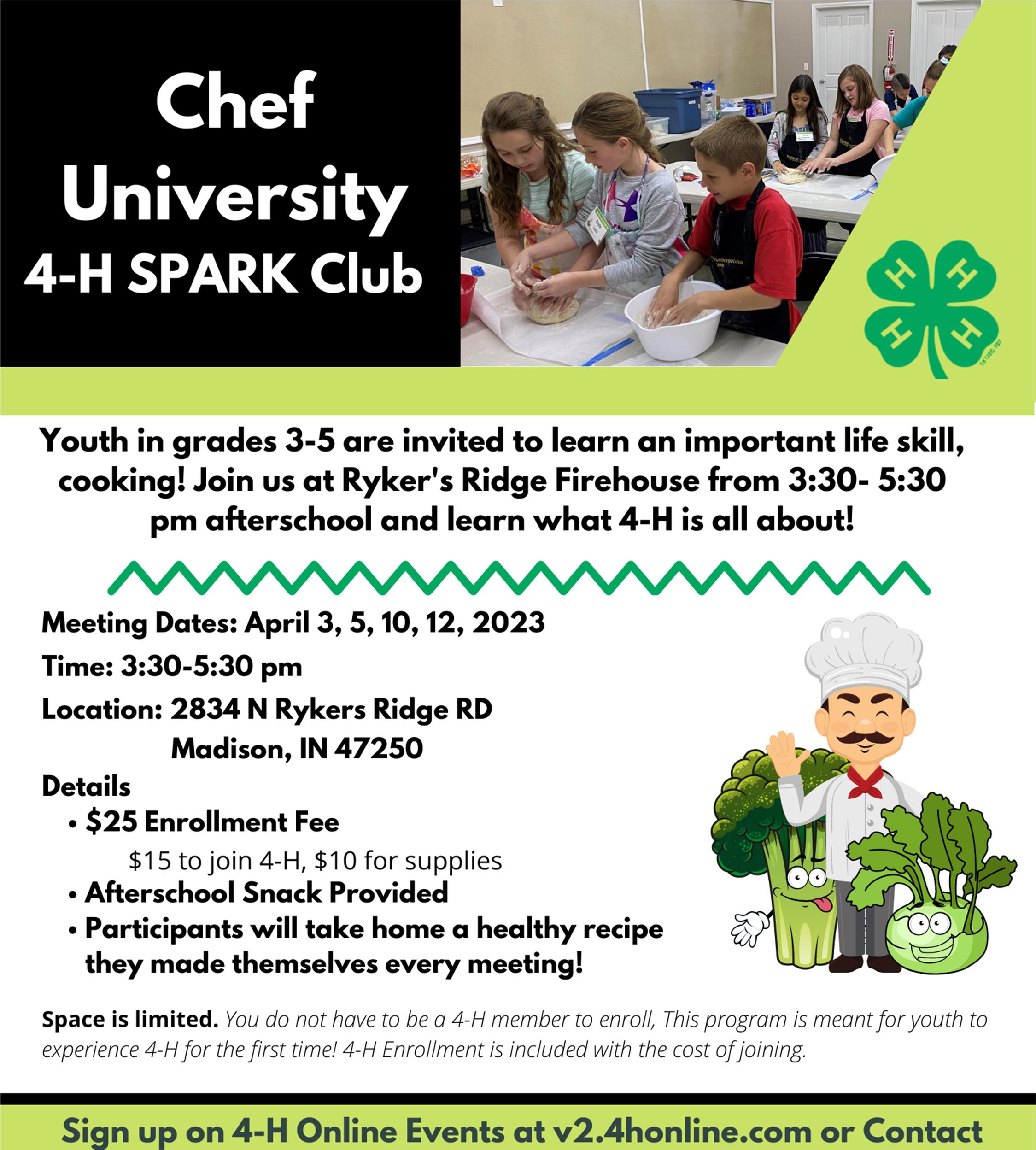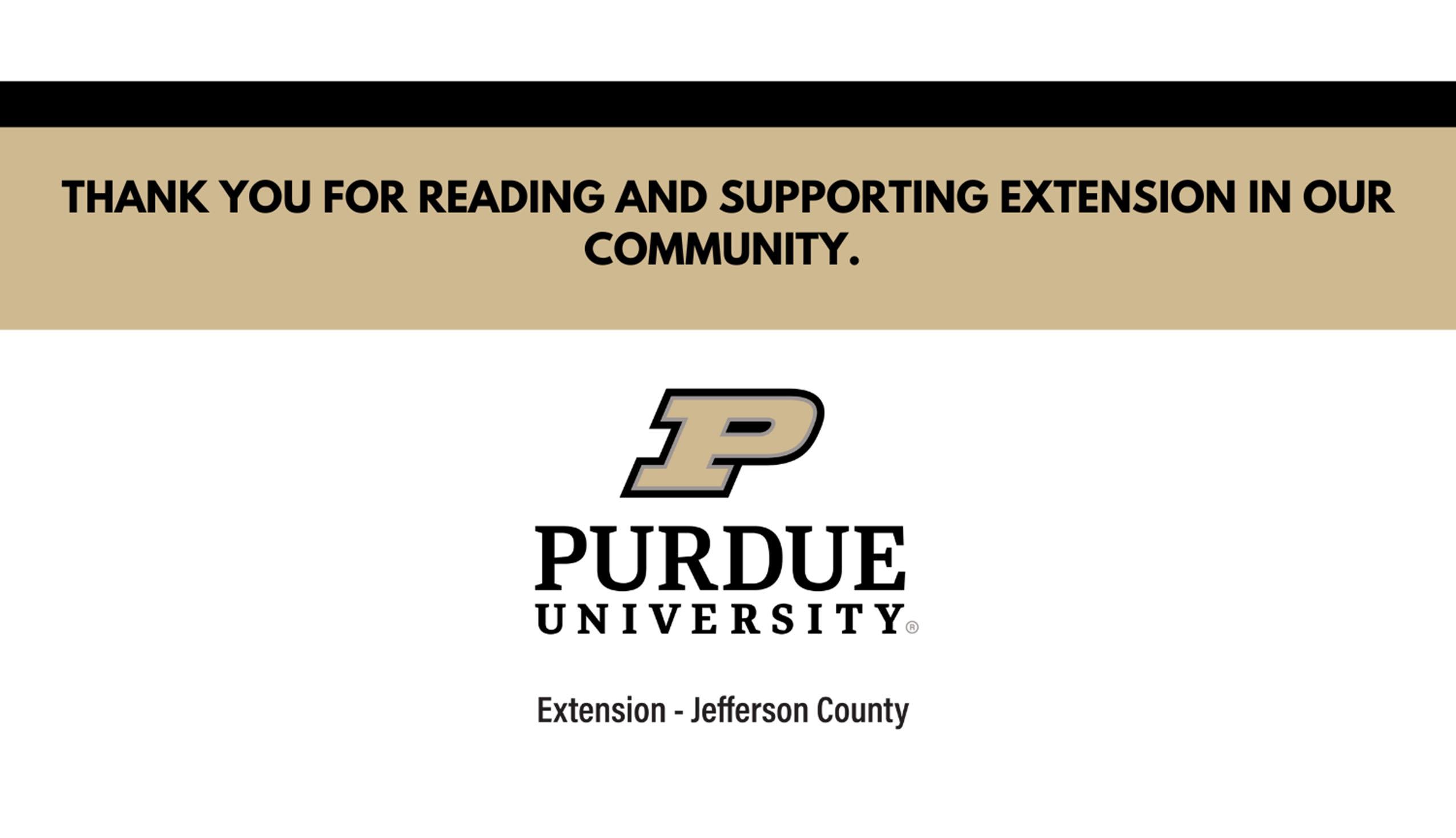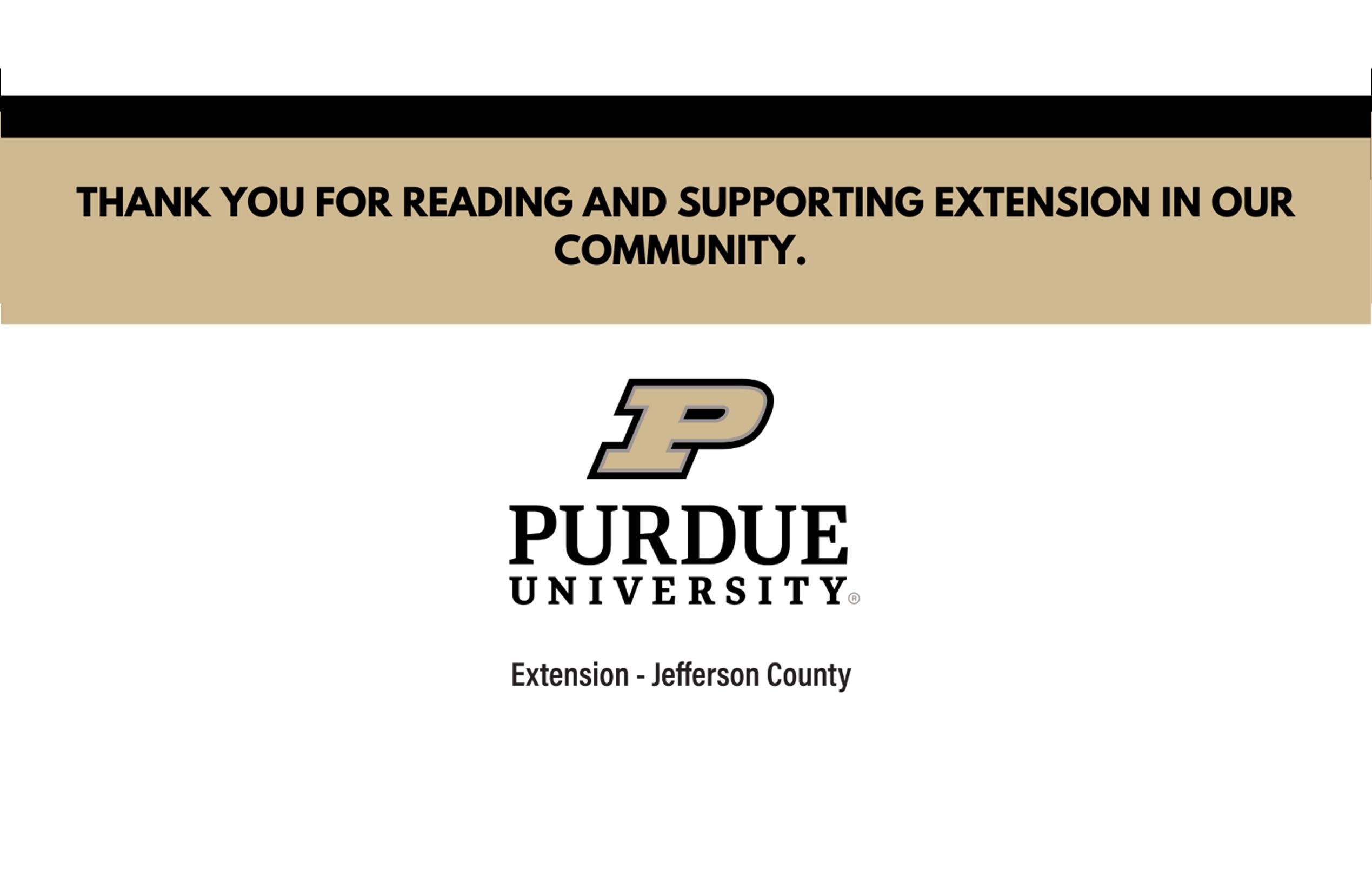







Dear Reader,
Purdue Extension-Jefferson County is one of 92 Cooperative Extension Services in Indiana under the guidance of Purdue University. Starting with the Smith-Lever Act of 1914, Extension has provided services and education to diverse communities for well over a hundred years. What started out with rural electrification and educators teaching from train cars and wagons has evolved into the service we are a part of today. In Jefferson County we have two educators and two full-time staff that deliver and support programming in Agriculture and Natural Resources, 4-H Youth Development and Health and Human Sciences.
Through this report we will share a few of our success stories from the 2021-2022 program year. We will also highlight the upcoming programs we are bringing to Jefferson County.
The most vital part of Extension is our dedication to being a community partner. We invite you to engage with us across all of our program areas so we may connect university knowledge to our community in the most beneficial way possible. Thank you for reading and supporting Purdue Extension in Jefferson County.
Sincerely,
 Britt Copeland, County Extension Director
Britt Copeland, County Extension Director
 Jessica Martini, Extension Educator Agriculture and Natural Resources
Jessica Martini, Extension Educator Agriculture and Natural Resources

Health and Human Sciences
4-H Youth Development copelanb@purdue.edu koons0@purdue.edu
4-H Youth Development
Kasie Bachmann, Office Manager


Bess Adams, Program Assistant kbachman@purdue.edu bladams@purdue.edu
Success Stories
Ag&NaturalResources
4-HYouthDevelopment
HealthandHumanSciences


Page 3
What’s Next Page 12
UpcomingImportantDatesfor4-HVolunteers

TobaccoGAPS&PARPProgram




Newto4-HMeeting
SafeSitter4-HSPARKClub
Program Area Overviews Page 8
Extension Leadership Page 10
Tenure of 4-H Volunteers Page 11
ServSafeHandlerCourse
ChefUniversity 4-HSPARKClub
ExperienceVetScience4-HSPARKClub
SEI4-HCamp
Mini4-HCamp


Giving youth practical skills, striving to eliminate food deserts and encouraging healthy eating practices are just a few of the possible benefits of community gardens. For a community garden to be successful, strong partnerships and a basis of horticultural knowledge is required. Extension is well positioned to provide coordination of community groups, assets and volunteers to provide a reliable source of horticulture education.
I partnered with the Jefferson County Boys and Girls Club to deliver the Junior Master Gardener program to 16 youth in the summer daycare program. Funds were secured by the Boys and Girls Club to construct 4 raised beds on club property. Over several sessions, 10 hours of instructional programming was delivered to youth on horticulture and healthy living topics. Sessions were designed to take the group from the planning stage through harvest. After each session youth were taken to the garden to put into practice the concepts learned in the sessions. Youth were in control of what vegetables were planted, how the garden was maintained and when the crops were harvested. Master Gardener Volunteers also helped to assist in gardening tasks such as planting and maintaining the beds.
Impact was measured with a Texas A&M AgriLife Instrument.
Informal feedback from participants was overall positive. The survey instrument indicated the following results about their experience:
12 indicated that they enjoyed gardening.
8 youth indicated participating in the garden program made them want to come to school (Boys and Girls Club)
6 indicated that gardening has helped them become better at math and science.
5 indicated that because of participating in the gardening program, they have taught someone else to make better food choices.
Qualitative comments when asked "what was the most important thing you learned in Junior Master Gardeners?" included; "Spinach actually tastes good, "gardening is fun", "plants need water to survive", and "learning how to plant."



This program is easily replicated in schools and community groups. We are working to offer this program again in the Hanover Area. Contact the ANR Educator to learn more about this program.

Providing opportunities for youth in the kitchen encourages kids to try healthy foods which ultimately leads to a healthier lifestyle and reduction in childhood obesity. The American Heart Association suggests that children who learn to cook are likely to eat healthier as adults. Youth also have the opportunity to learn about different cultures through food. Teaching healthy living and cultural awareness in the kitchen is an issue in Jefferson County identified through informal needs assessments in our county's 4-H Expansion and Review Committee. Addressing this issue in our community highlights the 4-H program’s utility as an educational resource to funders, parents and members.
We utilized the 4-H Chef University curriculum to create a 4 session 4-H SPARK Club to increase membership and teach healthy living. We partnered with Rykers Ridge Volunteer Fire Department to use their facilities and utilized grant funding from Premier Ag Companies to purchase cooking utensils and ingredients so that teams of three would be able to each create recipes that they could take home after the two-hour session.
Sessions began with an Extension Educator demonstrating a kitchen safety topic such as knife safety, using measuring tools, kneading dough, cross contamination prevention and disinfecting surfaces etc. Next, the recipe would be modeled in the front of the class. Afterwards, the teams of three were released to their work stations to create their own recipes. While recipes where baking or setting, there would be a 20-minute physical activity. After the baking was done and while food was being tasted, an Extension Educator would lead a discussion on MyPlate and what parts of MyPlate where represented in the meal and what cultures were represented in the dish. There were 4, 2-hour sessions for a total of 8 education hours. The Extension Educators were joined by 5 4-H Volunteers to help supervise the use of knifes, ovens and other kitchen utensils. Dishes created included whole wheat pretzels (grains), veggie frittatas (proteins), pesto pizza (vegetables), fruit salsa (fruits), and a celebration cake on the last day to highlight eating desserts in moderation.
We plan to repeat this program for a third time this spring. Contact educators if you are interested in this program.

4-H Common Measures 2.0: Healthy Eating & Food Preparation was administered to collect impact.
We had 21 youth complete the program. Participation was limited due to kitchen safety.
Most youth (76.5%) reported they learned about healthy food choices at 4-H, and over three-quarters (81.3%) have given their family ideas for healthy meals or snacks.
Youth reported on a 3-point scale (1=No, 2=Sort of, and 3=Yes) that they were knowledgeable about how to: handle hot pots and pans safely (3.00) and keep your cooking area clean to stop spreading germs (3.00).
Ten indicated this was their first 4-H activity.
Youth indicated for future 4-H participation, they would like to meet in person about the same topic(75.0%).



According to the American Veterinary Medical Association, today's veterinarians are the only doctors educated to protect the health of both animals and people. Veterinarians also play critical roles in environmental protection, research, food safety, and public health. A great deal of skill and knowledge is needed to enter professions in veterinary medicine. 4-H Youth Development can address this issue by kindling interest in veterinary medicine through hands-on experiences in our program. These experiences will spark youth's interest in fulfilling the requirements of a career in veterinary medicine.
Extension Educators collaborated with a handful of businesses and schools within our community to create a day-long (8 hour) experience that provided 17 participants with a behind the scenes look of a variety of careers in veterinary medicine. The day began with a tour of a local veterinary office and an interview with a practicing vet and vet technician. Participants were able to watch a dental procedure during this tour.
We then toured Ivy Tech Madison's campus and used a 3-D printer to create skeleton teaching tools of small rodents. This was followed by a brief anatomy lecture from a Biology Professor exploring a third career field. We had lunch at Hanover College and toured their science center in the afternoon. Lastly, participants returned to the fairgrounds. Extension Educators led the last session on animal biosecurity, providing a look into a 4th career path related to animal science. Participants enjoyed an action packed day and gained a variety of experiences all related to the same career field.
We plan to repeat this program this spring. Contact educators if you are interested in this program.


Southwestern School Corp.
4-H Common Measures 2.0: Animal Science: Life Skills and Professional Development was administered to collect impact.
We had 17 youth complete the program.
Youth were asked about animal science career aspirations. On a 3-point scale, youth reported they would be most interested in a career raising animals (2.88) or caring for animals (2.88).
Youth reported about learning 21st Century skills. Highest average scores, on a 3-point scale were: they value taking care of something other than themselves (3.00) they met new people because of their animal science project (3.00), and they learned how to set goals for a successful animal science project (2.94).
Half of the youth (50.0%) indicated that this was their first 4-H activity.

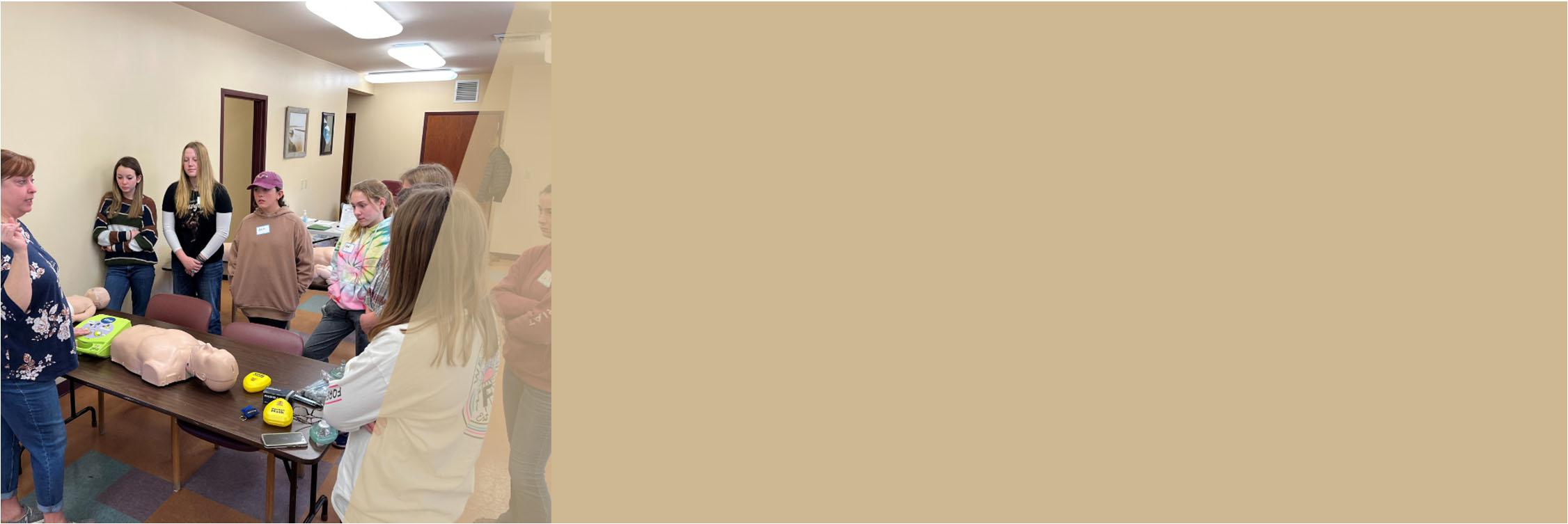
According to the Indiana Youth Institute 2021 County Snapshot, the total youth population for Jefferson County is 6,634 youth between the ages of 0-17. However, there are only 2 Licensed Center Childcare Providers listed for Jefferson County. With such a large youth population, it is essential to have more options for safe and affordable childcare. In order to help meet this need and equip teens with the skills necessary to care for themselves and younger children, Purdue Extension Jefferson County has offered 2 separate babysitting SPARK Clubs during the 2021-2022 program year.

The Babysitting Academy 4-H SPARK Club was held in February of 2022. In total, 8 youth participated in the program and learned key child development, healthy living, and CPR/First Aid skills. In partnership with Norton King’s Daughters’ Health, each participant received an American Heart Association Heartsaver certificate. The course was taught through a 6-hour event that featured CPR/First Aid lessons taught by a Norton KDH Heartsaver Instructor and child development and healthy living lessons facilitated by the Extension Educator.
After the success of Babysitting Academy, the Extension Educator was awarded a Professional Development Grant from the Indiana Youth Institute to pursue becoming a Safe Sitter Independent Instructor. Safe Sitter is a nationally recognized program that teaches 6th-8th grade youth how to be safe when home alone, watching younger siblings, or babysitting. In addition to the Safe Sitter training, the educator was also trained by Norton KDH to be a certified Heartsaver Instructor. With both certifications, the educator was able to host the first Safe Sitter 4-H SPARK Club in December of 2022.
The Safe Sitter 4-H SPARK Club had 12 total youth attend. Of those participants, 8 youth were new to 4-H. Youth participated in the Safe Sitter Essentials Training with CPR. This training included safety, first aid and rescue, child care, and life and business skills taught by the Extension Educator. All CPR manikins were graciously provided by Norton KDH for the training. As a result, all 12 participants received a nationally recognized Safe Sitter Certificate.
The Safe Sitter 4-H SPARK Club will be offered again this spring!
Thank you to these partners:
4-H Common Measures 2.0: Healthy Living: Healthy Decision Making was administered to collect impact.

8 youth completed the Safe Sitter 4-H SPARK Club.
Most youth (85.7%) reported they encourage their friends to make responsible choices

All of youth (100%) reported they talked about risky behaviors during the 4-H program.
Of the 8 participants, 1 participant was new to 4-H.
12 youth completed the Safe Sitter 4-H SPARK Club.
All youth (100%) reported they encourage their friends to make responsible choices. All youth (100%) reported that the three risky behaviors (drinking alcohol, smoking and taking drugs) were not okay.
Of the 12 participants, 8 youth were new to 4-H.



According to the Centers for Disease Control and Prevention, 30.3 million people in the United States are impacted by diabetes. With roughly 10% of the U.S. population living with diabetes, Purdue Extension has made it a priority to offer the Dining with Diabetes program to local communities. While diabetes is a serious condition, it can be managed through lifestyle changes and medication to help lower the risk of complications. Lifestyle changes can also prevent or delay the onset of type 2 diabetes. The Dining with Diabetes (DWD) program is a cooking school for people with diabetes, those at risk for diabetes, and caregivers of those with diabetes. DWD consists of four weekly sessions and a three-month reunion session to help participants stay accountable.
In the fall of 2022, Dining with Diabetes was offered in Jefferson County to a total of 10 individual participants. Extension Educators from Jefferson and Ripley County facilitated lessons about carbohydrates and sweeteners, fats and sodium, physical activity, and other skills associated with management of type 2 diabetes. At each session, two recipe demonstrations were provided to showcase healthy eating and food preparation techniques.
The program fee for Dining with Diabetes is normally $40 per participant. However, through a sponsorship from the United Healthcare Community Plan, all 10 participants were able to attend the program for free. Partnership through Norton King’s Daughters’ Health was also secured to provide additional educational resources to all participants. The partnership allowed for a Diabetes Educator from Norton KDH to attend each session of Dining with Diabetes and provide clinical expertise regarding type 2 diabetes management.

Dining with Diabetes will be offered again in the fall of 2023. Please contact Purdue Extension Jefferson County for details.


Thank you to these partners:
Impact was measured with the National Extension Working Group evaluation for Dining with Diabetes.
A total of 10 individual participants attended at least one session of Dining with Diabetes.
4 participants completed the post-test evaluation. Notable post-test evaluation results can be viewed below:

100% of participants reported eating 2.5+ cups of vegetables at least 4 times in the last 7 days.
100% of respondents indicated that according to the Plate Method, non-starchy vegetables should make up ½ of the plate.
75% of participants reported understanding which products contain high amounts of saturated fat.
Participants provided qualitative comments indicating that they enjoyed "trying new things", “learning be er ways to prepare foods", and that there was "good informa on presented in an interes ng format”.

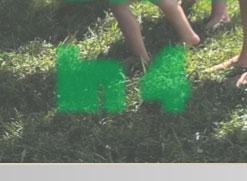

4-H prepares young people to be leaders in the community and around the world through hands-on experiences alongside their peers and adults. In Jefferson County, our 4-H program continues to be a point of pride and continues growing. Through the hard work of over a hundred volunteers our clubs and projects meet monthly, sometimes weekly, to deliver programming and instill life skills in youth. Below is a snap shot of our membership.
2,292
122
22 Members who went to 4-H Camp
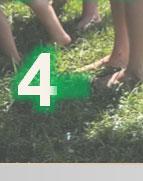
4-H Enrollment is still open! We invite you to join the fun. Visit v2.4honline.com to enroll in our program. You may also call or stop by the office, and we can get you signed up. In the back of this report there is a list of flyers for upcoming programs. Beyond those programs, below is a secondary list of offerings. 4-H Junior Leaders– a club for 7th grade and above focused on leadership and community service.
4-H Tech Changemakers– a new group of leaders formed in our county to educate the community about broadband access and digital literacy.
4-H Day at the Indiana Statehouse- Feb 7, four Jefferson Co. Members will travel to Indianapolis to lobby to lawmakers and learn about Civic Engagement
New to 4-H Meet & Greet—February 28, all new 4-H members are encouraged to attend and receive helpful 4-H info.

Mini 4-H Day Camp– June 24, Can’t miss opportunity for Mini 4-H members, lead by our Junior Leaders Southeastern Indiana 4-H Camp—June 5-9, Join members from 8 counties as we rock out this summer




Purdue Extension Health and Human Sciences provides education to individuals and communities in each of Indiana’s diverse counties. We bring university information to the local level – both in person and online – to help people strengthen relationships, eat smart, improve health, and achieve financial wellness.
The Jefferson County HHS Program provides a vast amount of programming to individuals across the lifespan. From Captain Cash for youth to ServSafe Food Manager for local restaurants, there is a program for everyone!
Health and Human Sciences Reach
183 Program Participants Reached
23 Jefferson County Extension Homemakers
11 HHS Advisory Committee Members
7 Signature Programs Offered
7 Single Session Programs Offered


*Data pulled from Annal Meeting 2022-Annual Meeting 2023
Looking Forward:
Captain Cash at Christian Academy of Madison— Captain Cash is a financial literacy program for 3rd graders that teaches them how to earn, save, spend, and barrow money. Captain Cash will set sail to CAM in March of 2023.

ServSafe Food Handler—April 20th at the Ext. Office—ServSafe Food Handler verifies basic food safety knowledge and is for individuals in food handler employee-level positions such as Homebased Food Vendors.
Purdue Extension Agriculture and Natural Resource Educators provide research based resources and educational programs to their local communities. In Jefferson County, we provide answers to your questions and programing related to horticulture, animal science, and natural resources to meet local needs. This work is supported by an advisory board of 6 local agriculturists.
In addition to educational programing our ANR
Educator is able to assist with:
Private and Commercial Pesticide License Information and Questions
Plant and Bug Identification
Soil Testing Information & Analysis
Forage Testing Information & Analysis
General ANR Consultations
Highlighted Programming from the 2021-2022 program year
Master Gardener Wreath Making Workshop– 63 participants learned about evergreens and supported the Hanover Community Garden project at the 2022 event.
Invasive Species Hike Program– 15 participants learned about noxious weeds and how to manage them.
Purdue Extension Master Gardener Program– 12 new MGS participated in a 15 week training program taught by local and regional educators. In addition, there were 4 events hosted by the Master Gardener association that were open to the public in 2022.
Pond Management Workshop– 12 participants learned about habitat and weed management Tobacco GAPS and PARP Program– 27 producers participated and earned certifications.
South Eastern Purdue Agriculture Center Field Day– 119 area producers earned PARP credits and learned about ongoing research.
Brice Gray Rick Stockdale
Bill Cain
Ashley Shepherd
Emerson Coles Bill Miller
Linda Shimfessel
Billy Keller
Scott Hubbard
Michael Hazelwood
Mary Ellen Wehner
Tanner Mahoney
Aaron Clayton Tim McDonough
Larry Sedam, Jr. Alinza Deuser
Tanner Mahoney
Carol Bell
Ella Grace Morris Shelby Morton
On this committee membership is staggered. Five members are elected each year at the Annual Fair Board Meeting in July for a three year term.
The 4-H Fair Board also acts as the 4-H Council.
All 4-H Adult Leaders are members. No Constitution or by-laws.
President: Carol Bell
Vice President: Wenda Feutz
Treasurer: Jane Wilson & Mary Ann Eaglin
Secretary: Wanda Stewart
BJ Cain
Amanda Briggs
Wesley Powell
Billy Bob Miller
Jason Goley
Debbie Long
Kodi Turner
Judy Smith
Debbie Long
Tanner Mahoney
Jill Deputy Binnie Phillips
Taylor Hubbard
Zach Hubbard
Wesley Powell
Olivia Bruce
Lily Sloan
Tonya Gross
Alicia Skirvin
Dr. Amanda Harsin
Molly Bruce
Keith Howard
Jane Stormer
Heather Foy
Krysten Snyder
Dr. Amanda Harsin
Shirley Kloepfer
Laura Arico
Tristan Imel
Scott Davidson
Kodi Turner
Hannah Bentley
President: Gregory Stewart
Vice President: Glenn Schulte
Secretary: Stacey Vester
Smyrna: Franny Phillips
What’s Next? The Following pages are flyers for Extension Programs we are excited about. Save the Dates!
The following is the general layout of a calendar year in the Jefferson County 4-H Program. All dates are published in the monthly Purdue Extension Jefferson County Newsletter that is sent to all 4-H families via mail and the family email associated with your 4-H Online account. This is our official source of communication; any changes or deadlines will be published in your newsletter. Dates are subject to change.
October 1- January 15
Enroll or reenroll in 4-H via v2.4honline.com.
January 15 is the Target Enrollment Date for 4H. Members are able to enroll after January 15th but the office transitions their mailing list at that date.
January 25
Indiana 4-H Scholarships are due for 10-12th graders on 4HOnline. Contact Extension office for more information.
February 1
Annual Extension Board Meeting and 4-H Leader Recognition Dinner.
February 10
Jefferson County 4-H Scholarships are included on the community foundation application due on February 10th. Contact your school counselor for more information.
April 15
Tagging Day for Beef and Dairy Beef Steers- 7 –10 am in the Hog Barn at the Fairgrounds. Animals tagged at a previous tagging day do not need to return.
If you plan to show at the Indiana State Fair you will need additional tags and a DNA hair sample taken at tagging.
Born & Bred Heifer Enrollment Form Due at Tagging.
April 29
Tagging Day for all Goats, Sheep, and Swine- 710 am at the Fairgrounds.
Animals tagged at a previous tagging day do not need to return.
If showing at the Indiana State Fair you will need additional tags and a DNA hair sample taken at tagging.
Swine Members:
Ractopamine Affidavits are due at tagging.
Born and Bred Gilt & Ewe Enrollment Form due at tagging.
May 1
Animal Lease Agreements are due to the extension office.
May 15
4-H Online Animal Enrollment Deadline.
Extension Staff will be set up at Tagging Days with computers to help exhibitors. Animals not at tagging still need to be enrolled by this date.
Rabbit, Poultry, Dogs and Cats do not have to be registered.
June 1
Entry discounts end for the Indiana State Fair Livestock and Animal Shows.
Fair Entry open to enroll exhibits. Deadline is June 30
June 5-9
Southeastern Indiana 4-H Camp at Camp Higher Ground for 4-H members in grades 3-12. Contact the extension office to learn more.
June 7-9
4-H Academy @ Purdue University, youth in grades 9-12. More information on joinindiana4h.org.
June 13-16
State 4-H Junior Leaders Conference
June 26-28
4-H Round Up @ Purdue, youth in grades 7-8. More information on joinindiana4h.org.
June 30
FairEntry Closes








